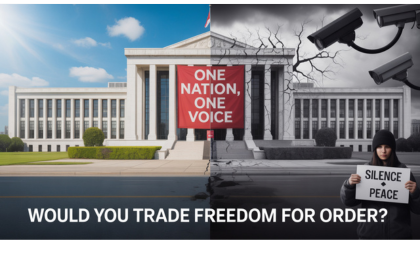Let’s play devil’s advocate for a second.
Imagine waking up in a country where everything just works.
Low crime.
Top-tier schools.
No gridlock in Congress.
No keyboard warriors on X screaming into the void.
Taxes are sky-high, but hey—so are the benefits. Free healthcare. Subsidized education. A nice, sturdy social safety net.
No culture wars, no campaign ads, no "BREAKING NEWS" hysteria every 4 minutes.
Sounds… suspiciously peaceful, doesn’t it?
Now snap out of it. That peace comes with a price tag—and no, it’s not just your paycheck. It’s your voice.
The Allure of One-Party Rule
Some countries make this look easy. Singapore, for example, keeps extreme poverty at just 0.5% and ranks in the global top 5 for government trust. Japan’s Liberal Democratic Party has held power for over 60 years with sky-high voter turnout and very little chaos.
It works when:
Everyone’s rowing in the same direction ideologically and culturally.
People trust the system to act fairly and transparently.
The population is small and cohesive, minimizing internal fractures.
But that’s not the U.S. And here's where the wheels fall off.
The Hidden Cost
One-party control isn’t always peaceful—it’s just quiet. And quiet doesn’t mean free.
Take China. Sure, they move fast—but dissent gets bulldozed. Think Tiananmen Square (1989) or today’s social credit system. Over 10,000 websites are blocked. Most media outlets toe the party line. That’s not order. That’s control in a very fancy suit.
Even in “functioning” democracies, long-term dominance breeds stagnation. Japan’s ruling party? Caught up in a 2023 slush fund scandal. When power doesn’t rotate, people get lazy—or worse, corrupt.
Now imagine this kind of setup in our hyper-polarized political blender, where only 30% of Americans trust the government. If one party took full control? It wouldn’t unify—it’d suffocate.
You’d get:
“Misinformation” crackdowns (translation: silence your critics).
School boards ignoring parents (unless they vote the right way).
Agencies picking winners and losers (and good luck appealing that).
Efficiency is great… until it’s weaponized.
Cracks in the Facade
Groupthink: The loudest idea wins—not necessarily the best.
Freedom’s Price: One worldview calling the shots means yours might get deleted.
Rot Sets In: No competition = no accountability. Corruption moves in like it owns the place (because it kinda does).
Final Thought
A one-party system might look shiny from the outside—but step inside and you’ll see the walls are padded.
Freedom isn’t tidy. It’s messy, loud, uncomfortable. But that’s the price of liberty: voices clashing, ideas colliding, and decisions being earned, not handed down.
So yeah, a one-party government might be efficient. But so is a dictatorship. Let’s not get cute.
What do you think?
Would you trade freedom for “peace and quiet”? Hit reply and let’s argue (reasonably, of course).





We already have a uniparty in the USA and it sucks.
Hierarchies always eventually turn tyrannical & draconian- even within benign religions.
Two-party deadlocks often have one benefit- they hedge against extreme excesses.
Even popular benign leaders often wear out their welcome towards the end of second term.
The Bushes did such bad jobs they triggered follow-up Fascism & Communism.
Therefore- term limits, no investing while in office, & minimal but controlled immigration are policies that help preserve each nation.
What initially made US great was not the immigrant tapestry itself- but the fact that like a successful sports draft, we were drawing only the best & ablest from abroad; prior to this Century middle classes just didn't exist + the learned were often persecuted. But today most countries have thriving middle classes that don't need to risk life or start over- so now we're getting Bush League rejects, schemers, welfare wannabes, and invaders that are looking to change societies- rule the world.
Disaster looming.